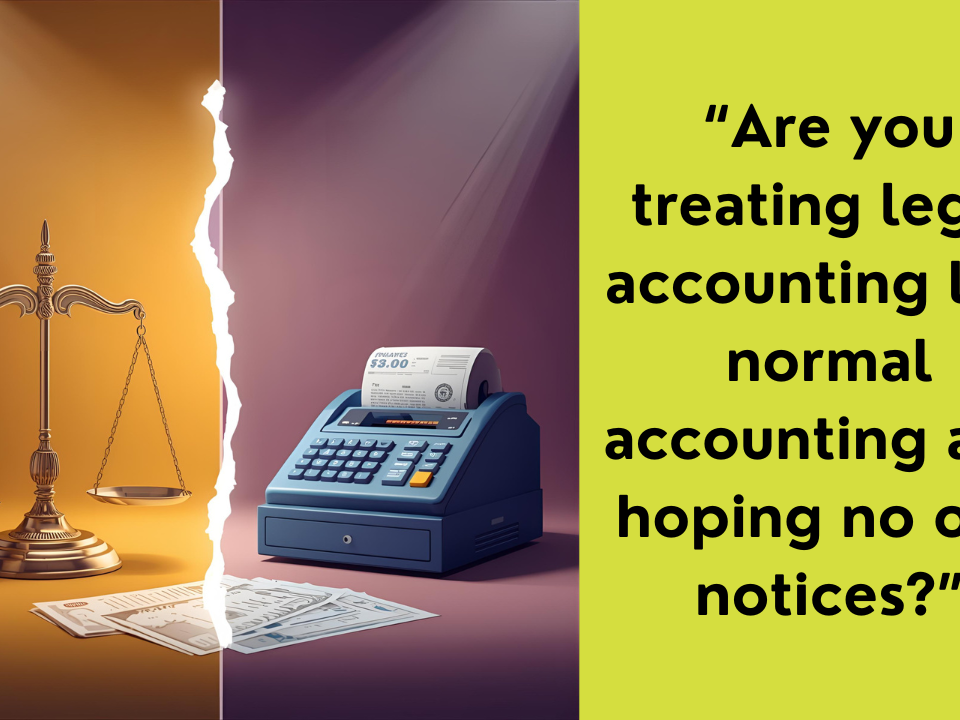Quantim Legal Solutions | Legal Software For South African Law Firms

From Chaos to Control: How Legal Accounting Software Can Help You Regain Operational Oversight!
July 14, 2025
Legal Accounting vs Commercial Accounting: Why They Are Not the Same Thing
October 23, 2025In the land of law firms, where client trust is gold and SARS is always watching, one golden rule stands tall: know the difference between fees and disbursements-or prepare to have your financials throw a tantrum.
Let us be real: to clients, a legal invoice already feels like interpreting ancient scrolls. So, if we start grouping disbursements in with fees, confusion kicks in, tax gets messy, and suddenly you are explaining to the auditor why you are paying VAT on money you did not earn.
Wait, What is the Difference?
Fees are your bread and butter-your charge for lawyering like a boss. Think legal advice, contract drafting, court hustle, and all the hours you spend making the law make sense. That is your income. It gets taxed, VAT is added, and it keeps the lights on.
Disbursements, on the other hand, are those annoying-but-necessary out-of-pocket costs you pay on behalf of clients. Court fees, sheriff’s invoices, courier charges, travel, and yes, even that ridiculously overpriced expert witness. You are basically the middleman with a law degree.
In plain terms:
- Fees = what you earn
- Disbursements = what you paid for someone else
Why Keep Them Separate? Because It is a Legal Accounting Love Language
1. Transparency Is Sexy
Clients appreciate knowing exactly what they are paying for. If you blur the lines, they will assume you are padding your fees with random costs. And just like that-trust? Gone.
2. The Law Society Says So
Ethics. Compliance. Trust accounts. These are not just buzzwords. Your regulator requires disbursements and fees to be listed separately. You do not want to mess with them. They do not send love letters-they send audit teams.
3. Tax and VAT Nightmares
Misclassifying a disbursement as a fee? That is like voluntarily donating part of your income to SARS. You pay VAT on money that never belonged to you. Not ideal.
Let Us Break It Down With an Example
You pay R100 to file a court document. That is a disbursement. You pop it on the invoice, clearly labelled. Client reimburses the R100. No VAT, no income tax, no problem.
But if you (oops) log it as a fee, you have just added R100 to your revenue. SARS says: “Lovely, we’ll take R15 of that.” The client pays R115. You send R15 to SARS. And what is left? R0 for your trouble.
Basically: you have paid tax on money you never earned. Congrats, you have become your own worst billing enemy.
So, What must a Law Firm Do?
- Keep Receipts Like a Dragon Hoards Gold: Know exactly what a fee vs. a disbursement for every matter is.
- Invoice Like a Pro: Line items, clear labels, and no sneaky lump sums. Your clients and your accountant will thank you.
- Train Your Staff: Your billing team is not just pushing numbers-they are keeping you out of financial hot water.
- Know When to Charge VAT (and When Not To): Only charge VAT on disbursements if the law says you must. Otherwise, skip it.
Conclusion
At the end of the day, clearly separating fees from disbursements is not simply good practice-it is critical to staying compliant, avoiding unnecessary tax, and building client trust. But let us face it: juggling legal work, client expectations, and complex billing logic is already enough to deal with.
That is where Quantim Legal Solutions steps in.
Our legal accounting software is built specifically for law firms-making the separation of fees, disbursements, and VAT application seamless and foolproof. From precise billing to automated VAT calculations and crystal-clear audit trails, Quantim empowers legal practitioners to focus on what matters most: delivering exceptional legal service, not decoding accounting spreadsheets.
With Quantim, compliance is not complicated. It is automatic.









